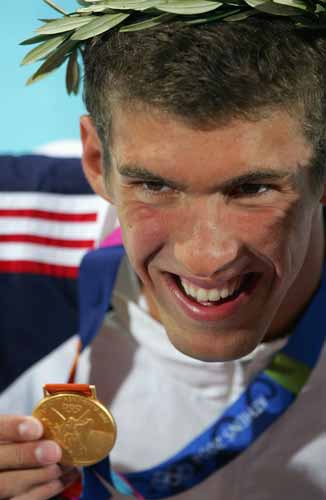Boy with attention deficit disorder who grew up to make Olympic history

Your support helps us to tell the story
From reproductive rights to climate change to Big Tech, The Independent is on the ground when the story is developing. Whether it's investigating the financials of Elon Musk's pro-Trump PAC or producing our latest documentary, 'The A Word', which shines a light on the American women fighting for reproductive rights, we know how important it is to parse out the facts from the messaging.
At such a critical moment in US history, we need reporters on the ground. Your donation allows us to keep sending journalists to speak to both sides of the story.
The Independent is trusted by Americans across the entire political spectrum. And unlike many other quality news outlets, we choose not to lock Americans out of our reporting and analysis with paywalls. We believe quality journalism should be available to everyone, paid for by those who can afford it.
Your support makes all the difference.In 1996 Bob Bowman, the head coach of the US men's swimming team in Beijing, made a prediction.
"By 2000," he said, Michael Phelps (who he was then coaching at North Baltimore Aquatic Club), would be "in the Olympic trials". "By 2004, he makes the Olympics. By 2008, he'll set world records. By 2012, the Olympics will be in New York and..."
Excepting the New York bit, Bowman – a Beethoven fan with a degree in developmental psychology – was, if anything, a little modest.
In Athens four years ago, aged just 19, Phelps did more than just compete – he won six gold medals and two bronzes. Yesterday he become the greatest Olym-pian ever when he won his 11th gold – and he could yet win three more.
Phelps has come a long way from his unhappy childhood, where his nicknames came from bullies rather than fans. Other children would mock his "sticky-out ears", his goofy expression, and his over-sized chin.
His extreme height (he was measured at 6ft 2ins shortly after his 14th birthday) invited incessant teasing at school. Even his mother admitted that her son "grew unevenly... it was his ears, then he had very long arms, then he would catch up somewhere else".
Together with his diagnosis for attention deficit hyperactivity disorder, for which he required daily doses of the drug Ritalin, the future Olympian provided bullies with more ammunition than most.
Phelps recently spoke for the first time of the "deep hurt" these experiences caused. He became, he said, quiet, introspective, angry – and rather good at swimming.
Born and raised in the blue-collar mill town of Towson, six miles north of Baltimore, Maryland, Phelps endured these early traumas every time he ventured into public. But life at home provided neither respite nor refuge.
Years after they separated for the first time, his father Fred, a state trooper, acrimoniously divorced his mother, Debbie, a school administrator and teacher, when Phelps was seven.
His two older sisters, Hilary and Whitney, would later recall the domestic maelstrom as a cage full of "yelling and bickering".
The sisters swam to escape, joining North Baltimore Aquatic Club, where Bowman took them under his wing. Their tortured little brother would soon follow them and, as is customary in such tales of sporting glory, his precocity was immediately the subject of some outlandish predictions.
His body fascinates scientists more than any other modern sportsman's. Though he stands at 6ft 5ins, his armspan is 6ft 7ins. His size-15 feet and paddle-like hands extend from a whippet-like 13st 10lb frame. He is so fit that at the end of a recent race, his muscles contained only two-thirds the lactic acid of his competitors'.
This body is subjected to a training regime that would make Steve Redgrave wince. Since the age of 14, Phelps has swum around 10 miles every day, seven days a week (including Christmas Day), all of it fuelled by breakfast servings said to big enough to feed "a small community".
And yet, all the while, the psychological scars of his youth find occasional expression in his habits away from the pool. After Athens, he was charged with drink- driving, for which he later apologised. In 2003, Phelps told his father that only his mother and Hilary would accompany him to the world championships in Barcelona. Fred Phelps missed his son's graduation party, and wasn't pool-side in Beijing.
But the legacy of a fractured childhood, if anything, supplements rather than diminishes the appeal of this 23-year-old's peculiarly wet version of the American dream.
Join our commenting forum
Join thought-provoking conversations, follow other Independent readers and see their replies
Comments